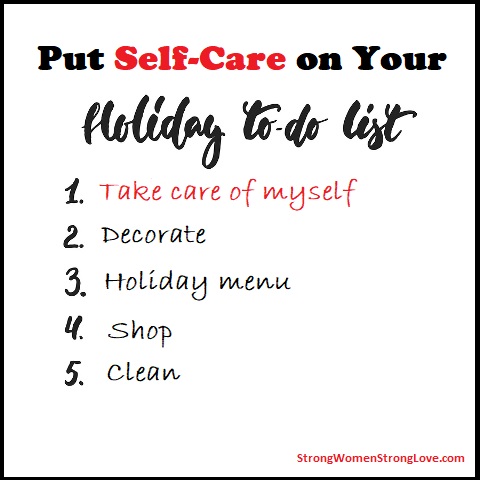by Strong Women Strong Love | Nov 12, 2017 | Persistent Pressures |

The holiday season is here! Are you ready? Our already-long to-do lists get even longer as we add shopping, decorating, cooking, traveling and even burning the midnight oil at the office to prepare for our time off.
Amid this frenzy of activity, self-care is often the first thing to go. As women, we can be so focused on making everything “perfect” for the special people in our lives that we overlook our own needs.
I’d like you to think about this in a different way, though. If you aren’t caring for yourself, you can’t really show up for the people you love. You’re more likely to be tired, stressed and critical. On the other hand, if your own needs are met, you can be fully, joyously present with others. And that’s the best gift you can give them.
So how can you practice self-care when you’re crazy-busy? Here are a few ideas.
- Need help with something? Ask. In particular, don’t expect your husband to read your mind about what should be done or how you would like it done.
- It’s a joyful time of year, but there are also plenty of things that can make you feel stressed or upset – from work deadlines to family tensions. Make a list now of healthy ways to relieve your stress (practicing yoga, doing a mindfulness meditation, reading something inspiring, talking with your friends, etc.) and refer to it often.
- Nostalgia can be a lovely part of the season. But pay attention if you notice you’re longing for “the way things used to be” – and can’t be again. A family death, divorce, estrangement or even a move can dramatically change your holiday season. Honor your grief, and work toward embracing the present and starting new traditions.
- You may not have time for your usual workout schedule, but don’t take an “all or nothing” approach. Do something physical every day, even if it’s just a walk around the block.
- Similarly, don’t totally abandon your healthy eating habits even as you indulge a little. Take the time to fully savor your food, especially your favorite holiday treats.
- Say no. To social plans when you need some quiet time. To second helpings when you’re already full. To whatever you need to. If the word “no” makes you uncomfortable, read my past blog article on reclaiming your boundaries.
- Don’t “soldier on” if you’re sick – all that does is delay your recovery.
- If your perfectionism can get out of hand this time of year, do a reality check with your family. What’s really important to them? (They might not even notice all those “magazine-perfect” touches you obsess over!)
- If anything starts to feel like too much – your in-laws, crowded stores, even decorations and music — take a break. You can even plan ahead for some escape time. For example, stay at a hotel instead of with your family or schedule a massage to escape from shopping.
Enjoy this season of giving – and remember to be generous with yourself, too.
by Strong Women Strong Love | Oct 15, 2017 | Parenthood, Persistent Pressures |

About one out of every 10 couples has problems with infertility. And, unfortunately, not all of them get the happy ending they sought: conceiving a child together. This can be one of the most painful challenges you and your husband face together.
If your infertility is caused by issues with your body, you might be experiencing guilt or shame. Both men and women often go through feelings like these if they believe they’re at fault for infertility.
You may even be worried that your husband will leave you because you can’t give him the child you had both longed for — and that he’ll seek out another woman who can. Again, such feelings are normal, and they happen to both wives and husbands. Sometimes one spouse even offers to let the other go so he or she can pursue parenthood with someone else.
Believe it or not, in an overwhelming majority of marriages, one spouse’s inability to conceive a child is not a deal-breaker for the other partner. In fact, if managed well, this experience can actually bring a couple closer together. The important thing is to keep the lines of communication open. Talk openly about your disappointments, your feelings, your fears. I’m willing to bet that your husband will tell you that his love for you is unchanged no matter what happens. Believe him.
It’s also vital to talk about what’s next for you as a couple. For many people, parenthood is closely tied to their sense of purpose in life. How true is that for the two of you? Are there other family building options you’re open to considering? Be honest. Do you want to explore other paths to creating a family? Or do you want to create a meaningful life in other ways? There’s no one right answer, of course.
I hope it’s heartening to know that others couple have felt the same things that you’re feeling and that their relationships have stayed strong. I encourage you to explore additional resources for coping with infertility and to work with infertility specialists in your community.
by Strong Women Strong Love | Jul 13, 2017 | Parenthood, Persistent Pressures |

You’ve married a great guy with wonderful children. The only problem? His ex-wife. She stirs up conflicts over the kids — and sometimes it even feels like she’s trying to win your husband back. So how do you deal with an ex-wife who seems to constantly fan the flames of drama? It takes a lot of thoughtfulness, maturity and grace under pressure.
She’s Not Going Away
Let’s start with a dose of reality. A person you didn’t choose to have in your life now plays a big part in it. That might not feel very fair. But, because she and your husband share children, she’s going to be a presence in your world for a while.
As you deal with his ex-wife, it might help to understand the emotions behind her hard-to-take behaviors. She may still be upset that your husband chose to leave their relationship. Even if she was the one who ended their marriage, she may be jealous of the fact that he’s moving on. She may feel insecurity about your being “the other woman” in her kids’ lives. Or she may fear that you’re competing with her or her kids for your husband’s time and financial resources.
It’s not on you to call her out if you suspect any of these issues. But realizing that she’s acting so badly out of hurt and fear — instead of just pure spite or evil — helps you navigate from a place of composure and compassion so that you don’t compound the negativity she creates.
If you have to interact with her in person, a good rule to follow is to try to show the same respect and friendliness you would to a stranger — for example, someone waiting in line with you. But as you resolve to act respectfully, you also have to prepare yourself for the fact that she might not return your kindness and maturity. That’s her problem. Just focus on being the bigger person. She may not appreciate it, but your husband certainly will.
Putting the Kids First
Resentments and power struggles between former and current spouses can play out in conflicts over the kids. You might cringe at the idea of your husband having any interactions with his ex, much less co-parenting with her. But remember that it’s in the best interest of your step-kids if their parents can work out issues together.
If your husband’s ex is making you the bad guy in disagreements over the kids, it can ease some tension to make sure he has primary responsibility for the kids when they’re with you, especially when it comes to discipline. You and your husband may also need to have a clear understanding of where to set boundaries in the relationship the two of you have with his ex. For example, if she’s calling you names or being disrespectful in some other obvious way, some clear limits may need to be set. The two of you will have to decide whether that’s best done by you or your husband. Of course, these decisions are best made when you’re calm and rational.
Also remember what we talked about it earlier: The idea of someone else acting as “mom” to her kids might be driving her crazy. Honor the relationship your stepkids have with their mother. Everyone – you, the kids, your husband, his ex – should be clear that you’re adding to the kids’ family, not replacing their mother in anyway. Hopefully, she’ll realize at some point that her children can only benefit from having more people who love and care for them. But it’s easy to be territorial, especially when a blended family arrangement is new.
Your Husband, His Ex
It’s possible for your problems with his ex to go beyond co-parenting disagreements. If his ex is acting in ways that feel like a threat to you marriage, that’s especially hard. Your anxiety about her (which, of course, she might be trying to provoke) can easily sow mistrust and discord that harm your relationship, so be careful.
Remind yourself that your husband is married to you now — and that there’s a reason he’s no longer married to her. Don’t let your fears take over. Trust him, and remind him of that trust. If the ex pushes your buttons to the degree that you can’t even talk about her with your husband, think about how to work with your emotions so that you can get to a calmer place. Managing your family’s relationship with her should be something you and your husband can communicate about.
Will Things Get Better?
Blended families may require a greater degree of thoughtfulness and intention. However, there is no rule that conflict has to be the norm. Plenty of parents work collaboratively and even amiably with former spouses, but it requires the adults involved to be mature and compassionate. Will you commit to doing your part to create the best environment for everyone involved, especially the kids?
by Strong Women Strong Love | Apr 16, 2017 | Persistent Pressures, Poisonous Patterns |

Even amid all the political bickering these days, Facebook can be a pretty romantic place. We’ve all read stories of people who knew each other in high school and even earlier reconnecting on the site and finding lasting relationships. When the reunited lovebirds are single before finding each other again, these stories make our hearts flutter. But if you’re married, talking to your ex on Facebook can be a little more complicated.
Social Media and Emotional Affairs
If you’re tempted to look up an old love, ask yourself what’s motivating you. Maybe your marriage is happy and you’d just like to know how your ex’s life turned out and wish him happy birthday every year. But if your marriage is struggling and you’re thinking about how perfect your old love was, now isn’t the time for a trip down memory lane with him.
Talking to your ex can put you at risk for an emotional affair — especially when you’re spending your energy reconnecting with your ex on social media, instead of with your husband in real life. It’s easy to idealize your ex on Facebook because we tend to present only the most positive parts of our lives on social medica. And when you’re typing on a screen, instead of talking face to face, you can lose your sense of what crosses the line from friendship into something more.
A piece of advice I gave in my blog article about emotional affairs also applies here. If you wouldn’t want your husband seeing the Facebook messages between you and your ex, your contact with your ex might be bad for your marriage. Now I’m not saying that your social media accounts have to be a completely open book for your husband. Or that his should be for you, for that matter. You both deserve some privacy and trust. But that trust comes with a responsibility to act in a way that doesn’t threaten your marriage.
Cultivate Intimacy at Home, Not Online
Another red flag? Talking to your ex about things you aren’t discussing with your husband. Your husband can’t be, and shouldn’t be, your only emotional outlet. But if you find it easier to be emotionally intimate with your ex on Facebook than with your husband, that’s a sign to focus on your marriage and your real-life social network, not your old acquaintance.
To head off any issues with social media use, I recommend that you and your husband be a part of each other’s social networks. After all, it’s easier to drift into trouble with your ex on Facebook if your husband is not on the network and doesn’t see you interacting with him. Being proactive about keeping your marriage strong also lessens any online temptations. You’ll find lots of tools to work on your relationship in my book Strong Women, Strong Love. Of course, you can also follow Strong Women Strong Love on Facebook.
by Strong Women Strong Love | Jan 15, 2017 | Persistent Pressures, Personal Power |

You might have seen this humorous bit of wisdom in your social media feeds:
Almost everything will work again if you unplug it for a few minutes. Including you. – Anne Lamott
There’s a lot to be said for those wise words. Give yourself breaks from the technology that seems to overtake our lives sometimes. It’s one of the healthiest things you can do for yourself and for your relationships.
Doing vs. Being
We live in a culture of busyness. Nothing demonstrates that more than our connection to our devices. We always seem to be scanning for new emails, texts and social media posts – a constant stream of information and things to do.
Living this way, though, makes it difficult to thrive.
Our brains function in two modes. The first one is doing. When we’re in doing mode, we’re focused on our goals, or we’re thinking about something that’s already happened. We’re either planning the future or reflecting on the past in some way.
The other mode is being. In being mode, we’re fully present and engaged with what’s right in front of us. Perhaps that’s feeling invigorated by a morning run or having a pleasant, intimate moment with your spouse.
The Problem with being Stuck
The technology we’re surrounded by these days makes it easy to get stuck in doing mode. The brain loves new information and it’s now possible to have a constant stream of it, day or night. It can be extremely difficult to unplug from this constant stimulation.
However, one of the inevitable problems when we spend too much time in doing mode is becoming emotionally off balance. Our brains need stimulation, but also rest and restoration.
Imagine your brain is like a snow globe. Too much doing leaves your brain feeling like the snow globe has been shaken up. It’s difficult to see clearly what’s going on in your life. You’ll make worse decisions, be emotionally more reactive, and be much harder to connect with.
We need to spend time in being mode to bring our brains back into balance. But a lot of us have the tendency to just keep pushing harder and harder, doing one thing after another. And our ever-present technology makes that even easier. Times we might have been forced to take a break in the past (for example, commuting or standing in line) we now fill with even more doing.
This just isn’t a sustainable way to live.
Shift Modes
We have to fight our tendency to think that things will be better if we can just do more. In fact, the opposite is true. If your life is feeling out of whack right now, I’m willing to bet it’s not because of the things you need to do. Instead, you’re probably craving more time just to be.
Make a list of things that pull you into the state of feeling present and engaged. Some common activities that can get us back into being mode are listening to music, exercising or moving in other ways, praying, meditating or deep breathing. Art, engaging a loved hobby, or being in nature can also help bring us into the present.
But if the thought of adding one more activity (even beneficial ones like these) to your day makes your head spin, you can turn anything you already do into one that mentally restores you. When you’re eating, put down your phone, pull yourself into the present, and actually taste your food. When you’re walking from your car to your office, refrain from checking your email, take a deep breath, and just notice the world around you.
Experiment some with unplugging this week. As you spend more time in being mode, you should feel emotionally steadier and less stressed. And you’ll probably also notice that you’re more present for the important people in your life.
by Strong Women Strong Love | Nov 16, 2016 | Persistent Pressures, Personal Power |

This time of year, you’ll see plenty of articles about how to have the happiest holiday season ever. You’ll find no shortage of advice on how to deck your halls, craft handmade gifts, start beloved traditions and dazzle at parties.
That’s all well and good, but I want to make things much simpler for you. Today I’m going to share with you one tip that could make this the least stressful holiday season you’ve ever had. It’s free. It doesn’t require crafting or cooking skills. It works no matter which holidays you observe. And it doesn’t have an expiration date. In fact, I hope you use it well after the last New Year’s celebrations have wrapped up.
What’s my magical tip?
When people get on your nerves, assume that they’re not doing it on purpose.
Trust me, you’ll have plenty of opportunities to try out this mental shift in the coming weeks. What if you stopped assuming things like this?
- Your husband leaves all gift shopping to you because he doesn’t value your time.
- Your friend posts pictures of her perfect decorations and gift-wrapping to make others feel inferior.
- Your brother is always late to gatherings because he’s trying to tick you off.
- Your mom only picks at the holiday meals you prepare because your cooking isn’t fancy enough for her.
The truth is, we’re all pretty self-involved. We don’t think very much about the ramifications our actions have on others. Unless a person has shown you before that he’s malicious (in which case you’ve got a whole other issue going on), it’s more likely that he just doesn’t know how he’s affecting you.
When you assume someone is being clueless instead of downright nasty, the whole situation suddenly feels a great deal lighter. You let go of resentments and start seeing constructive solutions.
Getting Past Assumptions
Since this blog focuses on how to strengthen your marriage, I would especially encourage you to stop assuming your husband has bad intentions when he does something that disappoints or irritates you.
The holiday season can be a time of high expectations, so it’s prime time for assuming the worst!
Let’s go back to an example from above:
Your husband leaves all gift shopping to you.
You’ve been assuming you know the reason for this behavior. You’re absolutely certain that it’s because he doesn’t value your time, so he’s intentionally passing the gift shopping off to you.
But what else could be behind his behavior?
- Maybe he thinks you love gift shopping.
- Maybe he believes you think he’s terrible at choosing gifts.
- Maybe his own mom did the shopping for their family and he just assumes that’s how all families do it.
- Maybe he doesn’t realize how long it takes and that it affects your schedule that much.
It’s also possible he really doesn’t value your time, but it’s important to be sure that’s the case before you work off that negative assumption.
Sometimes it’s easier to start by assuming your husband isn’t doing anything to you on purpose and just letting him know how his actions affect you. That could sound like:
With both our families growing, we’re gift shopping for more people now. Taking care of it all is leaving me pretty stressed. You’d be helping me a lot if we could start dividing up the gift list.
As an experiment this week, pay attention when your husband or anyone else pushes your buttons. Notice whether you automatically assume the worst about their behavior. If you do, try replacing that assumption with the belief that the other person isn’t trying to hurt you. How does that make you feel? Let me know how this mental shift works for you during the holiday season and beyond.







